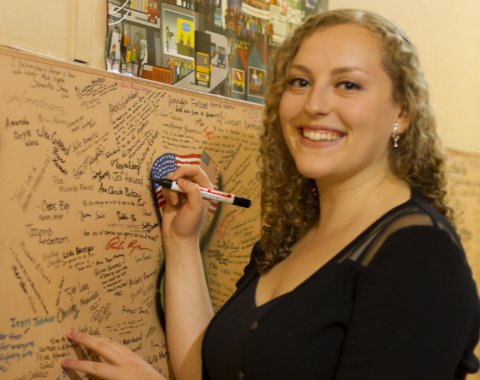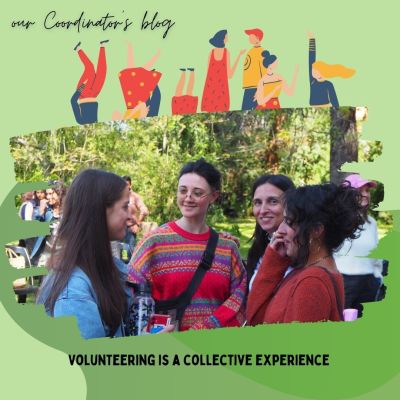It's 12:30 in the afternoon. Regina and I have spent the morning at the Espacio de Memoria in Belgrano, however, in true Argentinian fashion, the museum we had planned to go to afterwards is closed. But it's a beautiful day and we’ve found ourselves a good spot for lunch in the winter sunshine. We’ve spent the past eight weeks together in the Voluntario Global house and, as we both approach the end of our time here, it seems appropriate to do some reflecting. (My 'reflection piece' will come next week, today it's Regina's turn).
Regina has been volunteering at a health centre in La Boca as a Psychology Assistant – studying both psychology and Spanish at university, it's a very fitting role. I begin by asking her how she feels about returning to the U.S. “I'm going to be so sad! Honestly, I've had such an incredible time here I don't want to think about leaving.” Unlike other volunteers, Regina came here on a fellowship from her university in the United States . She explains that the programme is one year long: last semester, she took a class on Cultural and Social change in Latin America, conveniently taught by an Argentinian psychologist. Studying literature, film and poetry from Buenos Aires specifically gave her a bit of context to the porteño culture. And upon her return, a writing workshop will deconstruct her overall experience, where she will eventually produce a final essay encapsulating all she has observed and learned. Consequently, she tells me that this interview is proving very helpful – “I need to process!”
As we delve deeper into her studies, it becomes clear just how much not only working in La Boca but simply being in Buenos Aires has reinforced her particular interest in mental health stigma. Her final piece will require her to cite personal experiences beyond her work, shedding light on the community in which she has been placed. “I would say I see myself more as an observer than a traveller, paying particular attention to attitudes towards mental health in comparison to Americans.” Regina explains how the Argentinians have, in her opinion, a much more positive and open attitude towards mental health issues. “In America, we’re all so close-minded, it's almost as if it is a taboo subject. But here people are not embarrassed to talk about it, perhaps because it's more common, or maybe it's more common because people aren't afraid to address the problem.” To give the reader a bit of context: Argentina has the most number of psychologists per capita in the world with 50% of these based in Buenos Aires. I have been told by more than one porteño that most people have been to therapy; to go to a therapist is more ‘normal’ than to not go.
Inside and outside the clinic, Regina has witnessed this sense of openness and honesty firsthand. She explains that during initial interviews with potential patients and home visits, people have always welcomed her into the conversation, often speaking directly to her as well as the professional psychologist. Away from the clinic, she recounts how struck she was when asked directly if she had ever been to therapy. In America, it would be regarded as intrusive to ask such a question, but the Argentinian in this context was not being rude, it's just a different perspective on things. “America should take a leaf out of Argentina’s book!”
Regina’s other interest area is the intersection of mental health treatment and human rights; she feels that Argentina is one of the best countries in which to explore this. Indeed, our morning adventure is rather emblematic of how she has taken the initiative to engage in Argentina’s past and how its population remembers it. Relating back to what we saw at the Espacio de Memoria earlier, she contemplates how the grim reality that Argentines were locked up - in asylums or otherwise - by their own government in the recent past has affected mental health treatment. “It's something that I still need to learn more about before making any kind of judgements, but when I spoke to my coordinator at the clinic she agreed. For example, in 2011 a law affirmed the importance of rehabilitation within the community, as opposed to in an institute or asylum. I'm not sure quite what the link is, but it's definitely there.”
There's no doubt that, since arriving in Buenos Aires, Regina has gained a lot from her experience. Linguistically, the improvement has been great – she tells me, satisfied, that she is now able to listen in to conversations in the streets or on buses and understand (!) after being constantly forced to listen and communicate in Spanish. Crucially, she’s now more sure than ever that she wants to pursue psychology, and looks forward to interning in the U.S. in the future. As for me, let's just say that next week is going to be very strange without her positive energy and laughter about the house!






